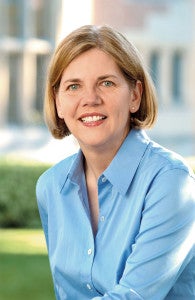
“Excessive pay isn’t the only cost of flawed compensation arrangements. Executives’ influence over their boards has produced pay arrangements that dilute and sometimes pervert incentives. Though the need to provide executives with adequate incentives is often given as the reason for the escalation of pay levels during the past decade, pay is much less linked to performance than is commonly recognized, and bonuses are often only weakly linked to performance. Also, much compensation is provided through stealth compensation such as retirement benefits that are largely decoupled from performance.”
Professor Lucian Bebchuk LL.M. ’80 S.J.D. ’84, on common flaws in executive compensation arrangements, in the April Optimize magazine.
* * *

“[T]he law passed by Congress on Monday was an obvious attempt–under the pretense of allowing the determination of federal constitutional rights–to delay the outcome decreed by Florida state law with the hope of making that outcome impossible. That is precisely the worrisome tactic employed with increasingly imaginative stays and orders of relitigation in a number of federal courts. … And it is also precisely the sort of tactic that Congress sought to discipline in the Effective Death Penalty Act.
“It is no good for politicians to try to justify this absurd departure from principles of federalism and respect for sound and orderly judicial administration by saying that, in this case, the life at stake is unquestionably innocent. For in many of the death penalty cases, the claim has also been that the prisoner had at least unfairly, and perhaps even incorrectly, been condemned to death.
“What we have is many of the same political leaders who denounced the Supreme Court’s decision forbidding states from executing those who committed their crimes as juveniles now feel free to parachute in on a case that had been within a state court’s purview for 15 years.”
Professor Charles Fried, on the danger to federalism posed by Congress’ intervention in the Terri Schiavo case, in the March 23 New York Times.
* * *

“Academics could argue for a long time whether advice on recusal fits within the literal language of a communication about ‘procedures affecting the merits,’ but there seems little doubt that the parties are vitally interested in the private advice that a judge receives about whether to recuse. … With academics doing so much outside consulting these days, an academic consulted ex parte may not be so ‘disinterested’ as the judge thinks. In addition, advice given informally and privately may be more off-the-cuff and less ‘expert’ than the inquiring judge realizes, and the pleasure and pride in being asked may lead to nondisclosure both of some ‘interests’ or of lack of expertise. There is also the danger that judges may select experts more likely to give the advice they desire and that experts may consciously or unconsciously lean toward giving the advice they believe that judges want to receive.”
Professor Andrew Kaufman ’54, on whether it is proper for judges to seek private expert advice about recusal, in the Feb. 21 National Law Journal.
* * *

“Why has it gotten so easy to fall off America’s economic ladder? The people in Washington who are rushing through the laws to make it harder … to file for bankruptcy say it is about over-consumption and lack of personal responsibility. But that ignores very real changes in the economic conditions facing today’s families. In inflation-adjusted dollars, today’s median-income families are spending less on clothing, food, appliances, and furniture than their parents spent a generation ago. They are spending more on electronics, but that additional $170 a year doesn’t explain 1.5 million families in bankruptcy. So where is the money going? Increases of 69 percent on housing costs and 90 percent on health insurance costs have ripped through the family budget. Other necessities, like gas and child care, are rising in price while wages are stagnating. In other words, the cost of being middle-class has shot beyond the reach of many families.”
Professor Elizabeth Warren, and her daughter, Amelia Warren Tyagi, on why bankruptcy filings have become more common in recent years, in the April 24 Boston Globe.